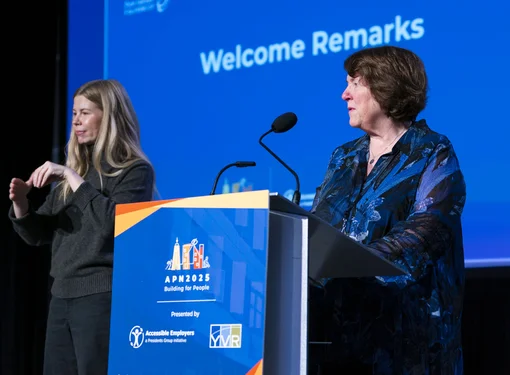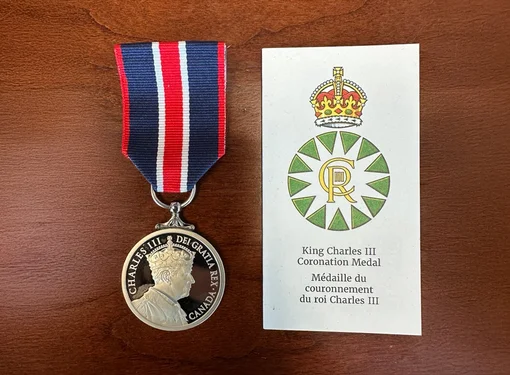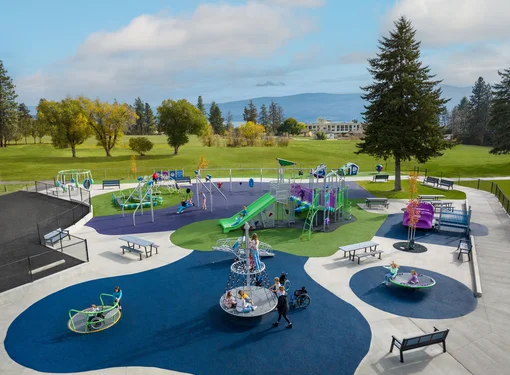Been There, Dug That: Jolan Wong: Canadian Pioneer of Sitting Volleyball
Photo Credit: Canadian Paralympic Committee
It’s not very often you meet an athlete who is part of a sport’s humble beginnings and still competes at its highest level.
Jolan Wong dons the No. 8 jersey for the Canadian women’s sitting volleyball team. She helped the squad win a silver medal at the 2023 ParaVolley World Cup in Cairo, Egypt, November 11 to 18, securing a coveted spot in the 2024 Paralympic Games in Paris, France. Paris will be Jolan’s third Paralympics, having already competed at three World Championships and two Parapan American Games in her 15 years wearing the Canadian jersey.
Sitting Volleyball began in Canada in 2008 and Jolan is one of the original players of that team. She was 18 at the time, five years after losing her leg to bone cancer at the age of 13. Jolan didn’t miss a beat, going from able-bodied sports such as soccer to discovering seated volleyball after her high school coach reached out to Volleyball Canada to ask if there was an adapted version.
The timing was fortunate. Sitting volleyball had just begun. It was the very definition of grassroots in this country; due to limited funding, the team had a solitary staff member behind the bench. Fast forward to 2023, and the team, ranked No. 2 in the world, includes a squad of coaches, managers, dietitians, mental performance coaches, and strength and conditioning experts. Jolan reflected on the camaraderie that held the team together during its formative years, a shared dedication amongst these female athletes with disabilities who were bound by their passion for sports and the unique challenges they faced, from good and bad leg days to phantom pain.
“What kept it all together during its growth was the women on the team,” recalled Jolan. “Everyone was just so dedicated. If you have a disability, then you understand this deep connection you have with others with a disability.”

Looking Back, Moving Forward
Sitting volleyball, a game requiring immense core strength, is unique because athletes do not require additional equipment. It is fast, and the action is explosive. It was invented by the Dutch Sport Committee in 1956 as a rehabilitation sport for injured soldiers. In 1976, it appeared as a demonstration sport for athletes with disabilities at the Toronto Paralympics. It wasn’t until 2004 that women’s sitting volleyball was added to the Athens Paralympic Games. It wasn’t long before other countries adopted the game.
Part of the beauty of playing a new-to-Canada sport at a competitive level is the freedom to try different positions. Jolan joined the team as a setter and, following a few seasons, transitioned into the libero position. Those who are familiar with the sport know that the switch from the offensive setter to the defensive libero isn’t an easy feat. Libero is a highly challenging position as there’s a focus on passing and digging with precise ball control, including when facing powerful serves from the other side of the net.
“I questioned the move because I thought passing was one of my worst skills,” said Jolan. “So, a lot of tears were shed, and I just had to keep showing up with belief in my coaches. They must see something, so there must be something here. It took me a while to buy in.” But Jolan is never one to back away from a challenge (even when speaking with RHF for this story, she was bouncing her baby on her lap while her daughter made quick appearances). In addition to her schedule as an athlete, she advocates for women’s sport in the realm of disability (ParaSport Ontario named her Athlete of the Year last year for her achievements both on and off the court. Jolan is also a ParaSport Ontario ambassador).
The community of women’s sitting volleyball is tight, even though players hail from different provinces. Jolan, who calls Pembroke, Ontario, home, travels monthly to Edmonton for training camps. She even traveled to the World Cup, understanding that she would be there in a slightly different role, mostly on the sidelines, as she returns to sport after having her baby. But, as things go, Jolan was put into the starting line-up and stayed for the entire tournament as the Canadian team needed her libero skills more than originally planned.
“I guess I turned competition mode on,” she said with a laugh, “Yeah, I’m pretty proud of that!”

Beyond the Courts
As most people with a disability will tell you, they encounter barriers regularly. But it has only been recently, through a teammate passionate about accessibility, that Jolan said she really has started paying attention.
“For me, barriers aren’t a lack of an elevator or anything like that – it’s simply the lack of a handrail on stairs. I need a handrail to go up and down stairs,” she said. “It’s the little things that are sometimes overlooked, and it didn’t faze me before, but now I recognize when things are inaccessible for many of the population. It’s not just for people with disabilities, but it often takes somebody with a disability to point things out. This isn’t okay.”
As Jolan travels a lot for comps, she encounters different instances of access. Even the recent World Cup in Egypt provided some eye-rolling examples. “We roll up to our training venue and it’s called, “Handicapped Hall,” which we thought was kind of funny – as in lost-in-translation funny,” Jolan said. “There were these ragged stairs down to the floor and we thought, ok, this is interesting. During practice, we saw people getting out of their chairs, going down the stairs, carrying the chairs beside them. We later realized there was a ramp, but it was outside, and we had to find it ourselves. Even my husband who was traveling with our baby stroller faced the same challenge with the stairs, which is another example of how lack of access affects more than just people with disabilities.”
But barriers don’t hold Jolan back. She was named ‘Best Libero’ at the World ParaVolley final Paralympic qualification tournament in Halifax in 2020, ‘Best Receiver’ in 2019, and a 2016 MP Commendation in her local riding in recognition of her leadership.
In Jolan’s relentless pursuit of excellence, it is clear that she is not just an athlete, but someone who illustrates that true success is not measured solely by medals but by the impact one leaves on the path to achieving them.

To commemorate International Day of Persons with Disabilities 2024, the Rick Hansen Foundation School Program invites you to join Jolan and fellow Paralympian Marissa Papaconstantinou (track) to discuss disability, inclusion, and accessibility in sport and physical activity. The webinar, Inclusive Sport: A Conversation with Paralympians, is hosted on Tuesday, Dec. 5, at 10 a.m. PT (1 p.m. ET.)







